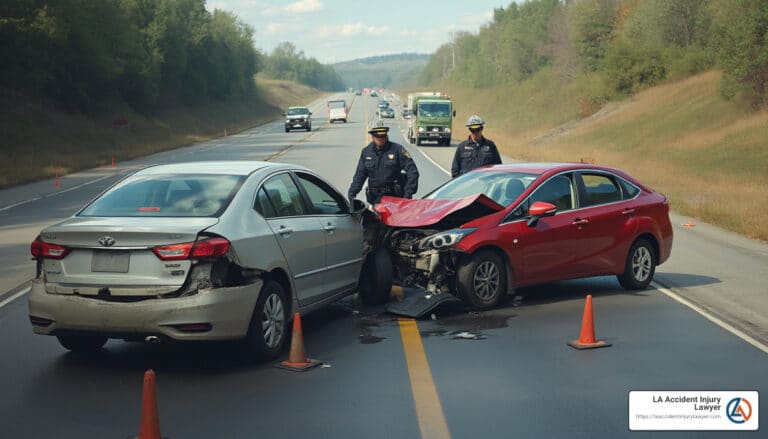
The aftermath of a car accident can leave victims feeling overwhelmed and uncertain about their next steps. Between managing medical treatment, recovering from injuries, and dealing with insurance companies, navigating the path to compensation can feel daunting. However, identifying specific indicators of eligibility can simplify the process and provide clarity during a challenging time.
Severe Injuries with Long-Term Effects
Car accidents often result in injuries that extend far beyond physical pain. When injuries require ongoing medical treatment or lead to permanent disabilities, the impact can be overwhelming. Whether a traumatic brain injury, spinal damage, or broken bones, these severe conditions may justify compensation to cover long-term medical costs and lost wages.
The severity of injuries can also impact the victim’s ability to work or perform daily activities. Reduced earning capacity and the inability to maintain a normal lifestyle often highlight the need for legal action. Compensation can help make up for funds lost due to recovery time, ensuring some level of stability for the injured party.
Medical documentation plays a vital role in proving the extent of injuries and their long-term effects. Accurate records from physicians and specialists are invaluable for establishing the connection between the accident and the damages suffered, making it easier to pursue a claim.
Mounting Medical Bills and Financial Losses
Medical expenses from a car accident can quickly spiral out of control. Emergency room visits, surgeries, rehabilitation, and follow-up care are just a few examples of costs victims may face. When these expenses pile up, they often create financial strain, even for those with insurance coverage.
Lost wages further complicate the situation. Time away from work, whether for hospital stays or recovery, can result in significant income loss. This financial burden is one of the primary reasons injured individuals pursue compensation through legal channels.
Beyond direct medical costs and lost wages, additional expenses such as transportation to medical appointments or home modifications due to disability may arise. These costs are also recoverable under compensation claims, making it essential to assess all financial losses resulting from the accident.
Evidence of Negligence or Reckless Behavior
Establishing negligence is fundamental to obtaining compensation. In car accident cases, this involves proving that another party’s careless or reckless actions directly caused the collision. Examples of such behavior include speeding, running red lights, distracted driving, or driving under the influence of drugs or alcohol.
Gathering evidence is critical in proving fault. Photos from the scene, witness statements, and police reports provide valuable insights into how the accident occurred. Traffic camera footage and expert accident reconstruction may also strengthen the case against the at-fault driver.
Negligence cases often involve insurance companies that aim to minimize payouts. Having strong evidence and a clear understanding of the laws surrounding fault in California is crucial to countering their arguments and maximizing potential compensation.
Emotional Distress and Psychological Trauma
The aftermath of a car accident extends beyond physical injuries. Emotional and psychological challenges are common, especially when dealing with the trauma of a severe collision. Anxiety, depression, and post-traumatic stress disorder (PTSD) often follow, leaving victims to grapple with invisible wounds.
Emotional distress can manifest in difficulty sleeping, fear of driving, or a general sense of unease in daily life. The long-term impact of such conditions can disrupt personal relationships, employment, and overall quality of life. Recognizing the need for treatment, such as therapy or counseling, is an important step toward recovery.
California law allows for the recovery of damages related to emotional pain and suffering. While more challenging to quantify, compensation for psychological trauma is vital in providing victims with the means to address these less visible but equally significant injuries.
Disputes with Insurance Companies
Dealing with insurance companies can be one of the most frustrating aspects of a car accident claim. These companies often prioritize their financial interests, leading to delays, lowball offers, or outright claim denials. Legal action may be necessary when an insurer refuses to offer fair compensation.
Policyholders often find themselves confused by complex insurance terms and tactics aimed at discouraging claims. These challenges underscore the importance of understanding one’s rights under California insurance laws and the need for experienced representation.
Navigating insurance disputes requires a strategic approach, including maintaining detailed records, understanding policy coverage, and seeking expert advice when necessary. Successfully resolving these disputes can ensure that victims receive the compensation they deserve.
Fault Laws in California and Comparative Negligence
California’s comparative negligence laws play a significant role in car accident cases. These laws determine how to divide fault among the parties involved in an accident. Even if someone is partially at fault, they may still recover compensation, but their percentage of fault reduces the amount.
Understanding this legal framework is crucial for those pursuing claims. For example, if an individual is deemed 20% responsible for an accident, they can recover 80% of the total damages awarded. This proportional system ensures that injured parties can still seek compensation if they only had a minor impact on the accident.
Accurate fault assessments often require legal expertise, as disputes about liability can complicate the process. Evidence, witness testimony, and legal advocacy are essential in determining the distribution of fault and securing a fair outcome.
Support for Complex Legal Processes
Car accident claims involve multiple legal steps, from filing the initial claim to negotiating settlements or pursuing litigation. The complexity of these processes can overwhelm victims who lack familiarity with the legal system. Having a trusted legal advocate can make a significant difference in navigating these challenges.
Experienced personal injury lawyers in Los Angeles understand the local legal landscape and the intricacies of California laws. This expertise can help victims meet filing deadlines, adhere to procedural requirements, and build strong cases.
Whether negotiating with insurance companies or presenting evidence in court, a skilled car accident lawyer in Los Angeles can provide the necessary guidance and representation. This support helps victims focus on recovery while leaving the legal matters in capable hands.
Understanding the True Impact of an Accident and How Personal Injury Lawyers in Los Angeles Can Help
The consequences of a car accident extend far beyond the immediate aftermath. Physical injuries, emotional trauma, and financial strain combine to create a significant burden for victims. Recognizing the signs that indicate a right to compensation is an essential step in rebuilding a life disrupted by an accident.
Accidents disrupt lives in unexpected ways, leaving lasting scars that often go unnoticed at first. By understanding the available legal options, victims can regain control and secure the resources needed for a full recovery. Compensation serves as a vital tool in restoring balance and ensuring justice.





